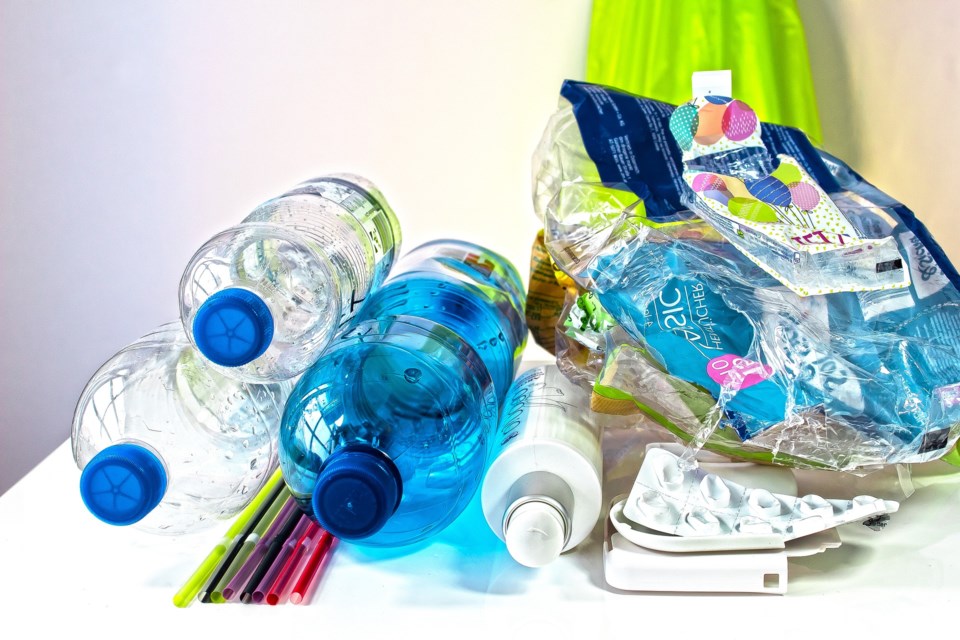In the middle of the last century, we had a love-love relationship with plastic. It’s great stuff! How could we not love it?
But now that we know the downsides of plastic, we need deal with our addiction. And we know we can do it because within living memory, plastic wasn’t in our lives. We got along without it before, so we can get along without it now.
The key problem is that plastic from fossil fuels, once made, is with the planet for a long time – possibly forever. That’s because plastic doesn’t actually decompose. Sure, a plastic bag is no longer a bag after 10—100 years (estimates vary) but it just becomes smaller and smaller bits of synthetic granules.
These small bits of plastic threaten animals, including humans. Micro-sized plastic looks like lunch to plankton-eating marine life. Some of these critters end up on our dinner plates, and so their plastic becomes our plastic.
Many of us have seen the image by the till at the General Store of a bird wrapped in plastic. Being ensnared in plastic is another way that marine animals are threatened. Imagine five plastic grocery bags, one on top of another, on every foot of coastline in the world, and you’ll have a picture of how much plastic is going into the ocean each year.
Recycling has a number of problems, but there’s a solution. “If we don’t buy it, if we don’t make it, we won’t need to recycle it,” says Louise McIntosh of Bowen Waste Service.
So, let’s figure out how to do without plastic whenever and wherever we can.
While plastic bags are significant, they aren’t the whole problem. We need to stop making plastic except for essentials (like medical supplies). And to do that, we need to pressure our governments to take action to counter the growing plastics industry that’s now being fueled by shale gas.
National Geographic has a kids vs plastic site that’s great for talking with children about plastic. kids.nationalgeographic.com/explore/nature/kids-vs-plastic/10-tips-to-reduce-your-plastic-use/
And here are 12 ideas that focus on getting rid of plastic in the kitchen:
- Bees wax food wraps instead of plastic cling wrap: like all plastic on food, it can leach chemicals into what you eat, particularly fatty foods like cheese.
- Glass or stainless-steel containers instead of plastic (Tupperware, Ziploc, etc.) containers: if you want to keep using the ones you have, never heat them. Dishwasher, microwave or oven-safe just means it won’t melt. It doesn’t mean it won’t leach chemicals that impact natural hormone production.
- Reusable sandwich bags or food wraps instead of Ziploc sandwich bags.
- A plate or paper towel in the microwave instead of plastic cling wrap: chemicals are more likely to enter your food when plastic is heated.
- Loose tea or tea bags made without polypropylene instead of tea bags made with a plastic. Contact companies to see which don’t use plastic. (Tetley says they are “actively working” on finding an alternative but haven’t yet.)
- Cotton shopping bags instead of single-use plastic bags. Reuse them many times to reduce the high environmental impact of manufacturing them.
- Refillable bottles for dish soap instead of single-use plastic dish-soap bottles.The Soap Dispenser in Vancouver refills Spadilla cleaning products. Nada on Broadway advertises “no packaging” and refills your containers.
- Reusable food containers instead of food on styrofoam or wrapped in plastic: Bulk Barn in North Van, and Nada in Vancouver, Ruddy Potato for take-out.
- Stainless-steel water bottles instead of bottled water. Nearly a million plastic beverage bottles are sold every minute (!) around the world.
- Paper bags for kitchen waste bins instead of plastic bags. If you’re composting organic waste, your garbage is probably pretty dry. Unless you have a huge bin on wheels, you can throw your garbage directly into your garbage bin. If that sounds too icky, use paper bags. Plastic bags embalm your garbage in landfills until they break down into micro- and nano-plastic bits. They pollute the soil, air, and leach into water.
- Fresh food whenever possible instead of canned food: The cans may have BPA or other chemicals in the lining that can leach into food.
- Unbleached coffee filters, reusable coffee filters, a Bodum instead of coffee pods: John Sylvan invented coffee pods and now regrets it because of the plastic they put into the environment. As he says, “It’s not like drip coffee is tough to make.”



